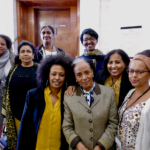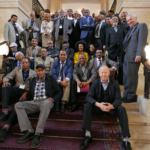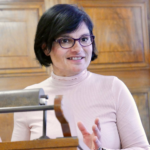By Martin Plaut, Senior Research Fellow, Institute of Commonwealth Studies
On 24 and 25 April 2019 a conference at the Institute of Commonwealth Studies (ICWS) brought scholars and activists from around the world to discuss the future of Eritrea. Around 70 people attended, coming from Botswana, Kenya, the USA and across Europe.
The conference – entitled ‘Building Democracy in Eritrea’ – reviewed the current situation and looked to the future. Eritrea remains one of the most repressive countries in Africa, with the UN Human Rights Council having published a report accusing the government of involvement in “crimes against humanity, namely, enslavement, imprisonment, enforced disappearance, torture, other inhumane acts, persecution, rape and murder”.
Ambassador Haile Menkerios, one of the continent’s most senior diplomats, was unable to attend. The former Special Representative of the Secretary-General to the African Union and Special Envoy for Sudan and South Sudan, Ambassador Menkerios is still involved in regional mediation efforts. He was Eritrean ambassador to Ethiopia and the African Union (1991 to 2000) and Ambassador Menkerios kindly sent a supportive message to the conference. He laid out his country’s complex history which was shaped by its fight for independence from Ethiopia (1961 – 1991). Faced with a far larger enemy, backed first by the USA and then by the USSR, Eritreans accepted an authoritarian (Isaias Afwerki) to lead their movement – the Eritrean People’s Liberation Front (EPLF).
In Ambassador Menkerios’s view this had severe consequences: “The enemy we had to fight was so formidable that getting rid of it consumed the major part of our energy, and we did not exert much effort to adequately plan and prepare for what and how to build once our enemy was defeated. Indeed we built a very efficient fighting machine in the EPLF with absolute discipline and hierarchical system as an effective military. Despite the prevailing rhetoric during the struggle, the EPLF did not encourage debate and discussion to develop concrete ideas about our future after independence and establish institutions or safeguards to ensure their implementation.”
In his view the only way to resolve the autocratic rule that this has led to is to is to hold a national dialogue. “I would suggest that in thinking about how to move, we consider going back to what we could and should have been done in 1991 immediately after liberation: Call for a national conference of representatives of the Eritrean people that would decide on a transitional arrangement to ensure an inclusive process of building participatory democracy in the country. I believe only such a process can prevent violence.”
Discussing Eritrea’s future
Ambassador Menkerios’s paper formed the backdrop against which the two days of discussions took place. The conference was opened by Thangam Debbonaire, MP, chair of the All Party Parliamentary Group on Eritrea, who welcomed the debate and discussion. There then followed two days of presentations by academics and senior Eritreans.
Among those who spoke on the rule of law and the administration of justice was the architect of the Eritrean constitution, Dr Bereket Habte Selassie, who was followed by Dr Mark Ellis, Executive Director of the International Bar Association. Dr Bereket drew on his long history of working on judicial questions in Africa, which go back to the time of the Emperor Haile Selassie. Dr Ellis promised to support work to establish a functioning system of law in Eritrea through the IBA.
Other notable contributions included a keynote speech by Dr Asia Abdukadir, (gender consultant with UNDP) spoke on the way in which the diaspora worked together, stressing the need to bring women and minority groups into the discussions. Professor Araya Abdulkadir asked delegates whether it would be worthwhile offering President Isaias a ‘soft landing’ including an amnesty for past alleged crimes, in order to persuade him to stand down.
Two women – Abeba Tesfagiorgis and Venessa Tsehaye – stressed the damage that had been inflicted on the Eritrean population by years of conflict and abuse. “We are all traumatised,” remarked Abeba. Venessa, who is studying law at SOAS, stressed the need to reach out to younger Eritreans, including the ‘transnational’ population who are now in the diaspora.
Dan Connell, an author who has traced the Eritrean revolution for more than three decades, and Professor Kjetil Tronvoll of Bjorknes University, Oslo, had both returned from the region in recent weeks. They had important insights into the new peace between Eritrea and Ethiopia, stressing the fragility and complexity of the current situation.
There was a useful session on Engaging with international democracies in which John Stauffer (President of the American Team for Displaced Eritreans) spoke of his experiences in interacting with the American public and Congress, while Habte Hagos described working in the UK and Kristina Melicherova discussed the work that her organisation (Europe External Policy Advisors), is doing with the European Union. Abraham Zere (PEN Eritrea) and Martin Plaut (ICS) discussed the media scene, both domestic and international.
In addition there were breakaway groups and Q & A sessions in which these and other questions were debated.
What next?
The conference, which was jointly organised by the ICWS and Eritrea Focus , was designed to be the first in a series. Supported by the National Endowment for Democracy and some private donations and backed by the ICWS, it is anticipated that further work will be done in a variety of ways.
 Over the next few months a range of working groups will be established. These will take forward the issues raised in the papers that were presented at the Conference. We will begin the process of thinking about how Eritrea might be reconstructed after a transition, so that the country can have the ‘softest of landings.’ The issues will include law and the constitution, the economy, women and minority groups and regional issues. There is a need to identify key scholars and able Eritreans, who can critique what is being considered, but who are also prepared to step forward once the current regime has gone. There is a great deal of work to be done.
Over the next few months a range of working groups will be established. These will take forward the issues raised in the papers that were presented at the Conference. We will begin the process of thinking about how Eritrea might be reconstructed after a transition, so that the country can have the ‘softest of landings.’ The issues will include law and the constitution, the economy, women and minority groups and regional issues. There is a need to identify key scholars and able Eritreans, who can critique what is being considered, but who are also prepared to step forward once the current regime has gone. There is a great deal of work to be done.



A stepping stone that is hoped to unite all Eritrean from all walk of life and in bringing the downfall and an end of the brutal regime of Isaias Afewrki and his open treachery that we had witnessed in recent months that truly shocked us all.
Thank you Mr. Martin Plaut for the summary of the conference. Given the current situation, there are four somewhat overlapping and outstanding issues that every peace and democracy loving Eritrean and friend of Eritrea must be seized on:
1. Eritrea in its entirety remains a Sovereign nation.
2. A clear plan on how to secure a peaceful transition to a new government
3. How and What needs to be done that democracy and the rule of law become the corner stone and an integral part of Eritrean society after the current regime is defeated peacefully.
4. A peaceful, clear, rational, legal and binding agreement that would serve as the basis or framework for the kind of relationship that Eritrea and Ethiopia must have going forward. Thank you